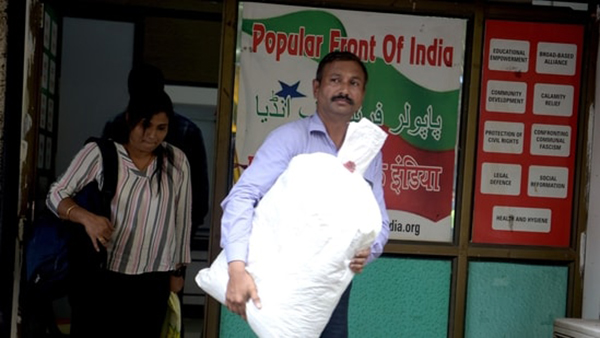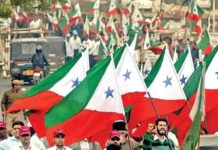
All Affiliates Also Banned for Five Years
In the largest terror operation of its kind, the National Investigation Agency (NIA) carried out wide nationwide searches, on 22 September, at the premises of people involved in terror-related activities. Nearly 100 people, including top leaders of the Popular Front of India (PFI), have been arrested following midnight raids.
The searches were carried out by the NIA and Enforcement Directorate (ED) at several locations across 13 states including Bihar, Kerala, Andhra Pradesh, Delhi, Uttar Pradesh, Karnataka, and Telangana.
Searches were conducted in the residential and official premises of people involved in terror funding, organizing training camps, and radicalizing people to join proscribed organizations.
The maximum number of arrests were made in Kerala (22) followed by Maharashtra and Karnataka (20 each), Andhra Pradesh (5), Assam (9), Delhi (3), Madhya Pradesh (4), Puducherry (3), Tamil Nadu (10), Uttar Pradesh (8) and Rajasthan (2).
39 locations were raided in Kerala. Searches were also conducted at one location in each in Maharashtra, Madhya Pradesh, Bihar, West Bengal and Manipur.
Director general of the NIA supervised the operation which included around 300 officers.
Chargesheet Filed
The NIA has earlier investigated over a dozen cases linked to PFI in which 355 persons have been charge-sheeted and 46 convicted.
According to the charge sheet filed by the ED, PFI has formed District Executive Committee in UAE, Oman, Qatar, Kuwait, Bahrain, Saudi Arabia, and other places to raise funds. Targets are given to individuals to collect cash and transfer the same through Hawala or camouflaged as genuine business transactions.
Shocking revelation of the Popular Front of India (PFI) planned to liquidate several RSS-BJP leaders came to light when Special Investigation Team arrested PFI activist Sirajjuddin on September 17 in connection with the brutal murder of RSS leader Srinivasan on April 16. A list of 12 RSS-BJP leaders to be assassinated from Malappuram was seized from him. Several incriminating documents were also seized from him, a Malappuram native.
The ED, during the investigation, analyzed more than 600 domestic contributors and their bank accounts and also looked at accounts of more than 2,600 beneficiaries. The agency has found that many of these accounts were bogus and people on the ground were not found during physical verification, the agency stated.
Second Round of Raids
The second round of searches was carried out at 93 locations in 15 states, including Kerala, Tamil Nadu, Karnataka, Andhra Pradesh, Telangana, Uttar Pradesh, Rajasthan, Delhi, Assam, Madhya Pradesh, Maharashtra, Goa, West Bengal, Bihar and Manipur. Earlier in September, the NIA had raided 38 locations in Telangana and two in Andhra Pradesh and seized digital devices, documents, weapons, and cash.
Meanwhile, PFI members staged protests in Tamil Nadu and Karnataka against the arrests.
Ban on PFI
The Centre declared the PFI and its associates or affiliates and fronts as an ‘unlawful association’ under the Unlawful Activities (Prevention) Act (UAPA). A ban has also been imposed on these outfits for five years.
According to a government notification issued 27 September, PFI and its associates or affiliates and fronts have been indulging in unlawful activities that are prejudicial to the integrity, sovereignty and security of the country. It further added that these organisations have the potential to disturb public peace and communal harmony of the country and support militancy.
The notification added that though the PFI had been operating openly as a socio-economic, educational and political organisation, it has been pursuing a secret agenda to radicalise a particular section of society, thereby undermining the constitution.
The order said there have been instances where the PFI members were found to have links with terrorist groups. Some of its members have even joined ISIS and participated in terror activities in Syria, Iraq and Afghanistan.
The Rise and Fall of PFI
The PFI’s formation was announced in 2006 in Bengaluru. It had since spread to Manipur, Assam, Uttar Pradesh, Delhi, Gujarat, Rajasthan, Maharashtra, and West Bengal. PFI also has a strong presence in Kerala, Karnataka, and Tamil Nadu.
PFI has links to proscribed organisations like the Jamaat-ul-Mujahideen Bangladesh, the centre’s notification said some of PFI’s founding members were the leaders of the banned organisation Students Islamic Movement Of India (SIMI).
The affiliate organisations of the PFI include Rehab India Foundation (RIF), Campus Front of India (CFI), All India Imams Council (AIIC), National Confederation of Human Rights Organization (NCHRO), National Women’s Front, Junior Front, Empower India Foundation and Rehab Foundation.
In the late 1980s, K.T. Mammu, a copra businessman from Vadakara in the Kozhikode district of Kerala, started an organisation named Muslim Cultural Centre as a “defensive move” against intimidation from the late A. Kanaran, a CPI(M) strongman from Nadapuram. This resulted in sporadic clashes between cadres of the Muslim League and CPI(M)—a fight that eventually earned a communal colour.
Mammu’s MCC was centred around kalaris (training centres for the martial art form, Kalaripayatt). He took the help of certain personalities associated with the Student Islamic Movement of India (SIMI)—which came into existence originally as the student wing of Jamaat-i-Islami and was banned in 2001, immediately after the September 11 attack on the United States—to run the centre.
E. Abubacker, P. Koya and E.M. Abdurahiman – all former office-bearers of SIMI—were the core team of the National Development Front (NDF), formed on November 14, 1993, inspired by Islamist reactionary movements that emerged in different places in India because of the Mandir-Masjid dispute. Thirteen years later, NDF, along with two similar outfits that emerged in the post-Babri Masjid period—Karnataka Forum for Dignity of Karnataka and Manitha Neethi Pasari from Tamil Nadu—would form the Popular Front of India.
Since its formative years, NDF figured frequently in political and communal killings in the state. In May 1997, they organised a conference on human rights, which decided to form an umbrella body of various human rights and civil liberties organisations. Thus was formed the Confederation of Human Rights Organisations (CHRO). In the early days, the organisation’s activities were restricted to Kerala. However, in 2007—after the formation of PFI—CHRO also became national. NCHRO was also banned on September 28 as a front organisation of PFI.
The PFI leaders played crucial roles in building several such NGOs, trusts and socio-cultural organisations in the last 15 years. These organisations were used by PFI to gain more acceptance in the community. PFI maintained that all these organisations were independent entities. Many of these front organisations also have been banned now. Their non-profit charity, Rehab India Foundation, claimed to have worked in poverty reduction and educational segment; their think tank Empower India Foundation’s flagship project was ‘India 2047’, which envisaged “ameliorating the current socio-political-economic-cultural-educational status of Muslim community in India by 2047.”
All India Imams Council, their organisation for religious scholars, Imams and madrasa teachers was floated in 2013. In 2009, The year 2019, the PFI launched its political outfit Social Democratic Party of India—with Abubacker as the founder president—its student organisation Campus Front of India and its women’s organisation National Women’s Front. Both CFI and NWF are banned now. Darul Khuda, another organisation they set up in 2009, allegedly acted as a “parallel judiciary” settling family problems, land and property disputes and other grievances under ‘Shariah’ at certain pockets.
Satya Sarini charitable trust, a missionary centre supported by the PFI, imparted religious lessons to persons who convert to Islam from other religions. The centre was in the eye of controversy when the Hadiya religious conversion case of 2017-2018—in which PFI defended the allegations that it is catering “forced” conversions—became a talking point.
Ashraf Moulavi, state president of SDPI, maintains that the SDPI has a different ideology and existence than PFI. Moulavi adds that because SDPI and PFI are two separate entities, the ban against PFI will not affect the SDPI. SDPI is a party registered with the Election Commission, however, without the Union government initiating actions, EC will not be able to make any major steps against SDPI.
If NDF was primarily a phenomenon in northern Kerala, PFI-SDPI had built a pan-Kerala presence in the last 15 years.
It was in the late 2000s that the IUML and other Muslim organisations openly started coming up with measures to isolate the NDF and PFI. A crucial incident that led to this was when the PFI activists chopped off the right hand of professor T.J. Joseph on July 4, 2010, accusing him of blasphemy.
In 2009, the Union home minister wrote a letter saying that there are certain pockets in Kerala where the police do not have any access and that it should not be allowed. So, the governments knew that they are developing such Sharia-ruled pockets. There are hundreds of such pockets in Kerala now.
On December 4, 2019, the home ministry sought information from all states about cases registered against PFI activists from November 2016 to November 2019. The maximum number of cases registered against PFI activists was in Kerala. In those three years, the maximum number of cases (104) was registered in Kerala. This was primarily for stoking communal tension, violent clashes, attempts to murder, provocative sloganeering, possession of arms, illegal assembly and sedition. The PFI activists were allegedly involved in at least five murder cases.
Political observers cite that a lenient attitude shown towards these extremist elements by the successive governments in Kerala catered for their transition from one form to another.
Over the years, the PFI built its money power also. The NIA estimates that it received over Rs120 crore as foreign funds.
PFI tried to portray themselves as the protectors of poor Muslims. They used to run a propaganda in Kerala that they are the only force to fight RSS in north India. In certain high-profile cases, they could manage to get their people out of jail. Showing this, they created an image that they can protect anybody which is a bluff. They also spread propaganda about their so-called ‘charity works’ in north India.

















